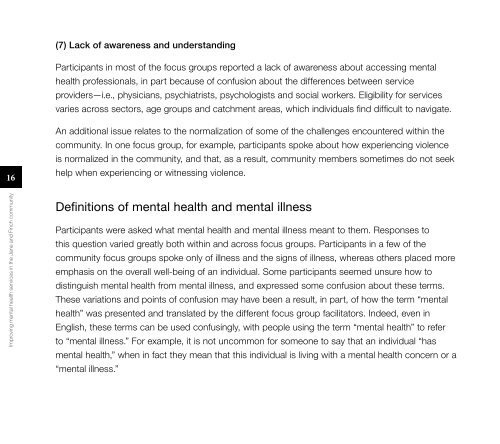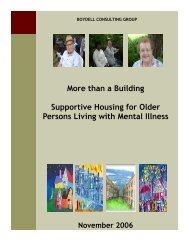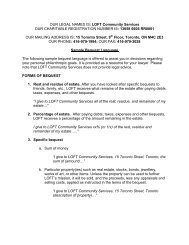Improving Mental Health Services in the Jane and Finch Community
Improving Mental Health Services in the Jane and Finch Community
Improving Mental Health Services in the Jane and Finch Community
Create successful ePaper yourself
Turn your PDF publications into a flip-book with our unique Google optimized e-Paper software.
(7) Lack of awareness <strong>and</strong> underst<strong>and</strong><strong>in</strong>gParticipants <strong>in</strong> most of <strong>the</strong> focus groups reported a lack of awareness about access<strong>in</strong>g mentalhealth professionals, <strong>in</strong> part because of confusion about <strong>the</strong> differences between serviceproviders—i.e., physicians, psychiatrists, psychologists <strong>and</strong> social workers. Eligibility for servicesvaries across sectors, age groups <strong>and</strong> catchment areas, which <strong>in</strong>dividuals f<strong>in</strong>d difficult to navigate.An additional issue relates to <strong>the</strong> normalization of some of <strong>the</strong> challenges encountered with<strong>in</strong> <strong>the</strong>community. In one focus group, for example, participants spoke about how experienc<strong>in</strong>g violenceis normalized <strong>in</strong> <strong>the</strong> community, <strong>and</strong> that, as a result, community members sometimes do not seek16help when experienc<strong>in</strong>g or witness<strong>in</strong>g violence.17<strong>Improv<strong>in</strong>g</strong> mental health services <strong>in</strong> <strong>the</strong> <strong>Jane</strong> <strong>and</strong> F<strong>in</strong>ch communityDef<strong>in</strong>itions of mental health <strong>and</strong> mental illnessParticipants were asked what mental health <strong>and</strong> mental illness meant to <strong>the</strong>m. Responses tothis question varied greatly both with<strong>in</strong> <strong>and</strong> across focus groups. Participants <strong>in</strong> a few of <strong>the</strong>community focus groups spoke only of illness <strong>and</strong> <strong>the</strong> signs of illness, whereas o<strong>the</strong>rs placed moreemphasis on <strong>the</strong> overall well-be<strong>in</strong>g of an <strong>in</strong>dividual. Some participants seemed unsure how todist<strong>in</strong>guish mental health from mental illness, <strong>and</strong> expressed some confusion about <strong>the</strong>se terms.These variations <strong>and</strong> po<strong>in</strong>ts of confusion may have been a result, <strong>in</strong> part, of how <strong>the</strong> term “mentalhealth” was presented <strong>and</strong> translated by <strong>the</strong> different focus group facilitators. Indeed, even <strong>in</strong>English, <strong>the</strong>se terms can be used confus<strong>in</strong>gly, with people us<strong>in</strong>g <strong>the</strong> term “mental health” to referto “mental illness.” For example, it is not uncommon for someone to say that an <strong>in</strong>dividual “hasmental health,” when <strong>in</strong> fact <strong>the</strong>y mean that this <strong>in</strong>dividual is liv<strong>in</strong>g with a mental health concern or a“mental illness.”Sources of supportFocus group participants were asked about <strong>the</strong> types of supports <strong>the</strong>y turned to for mental healthissues. Two categories for sources of support came to light <strong>in</strong> this discussion: (1) formal <strong>and</strong> (2)<strong>in</strong>formal sources of support.F<strong>in</strong>d<strong>in</strong>gs









